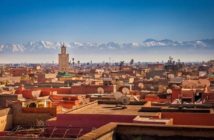Surfline.com
![]()
Click here for the photo and video slideshow
Morocco has been offering affordable, exotic, consistent winter surf to at least a couple generations of European surfers, as well as its own burgeoning surf population. In the last decade or so, more international visitors have been exploring its diverse and craggy coastline during the winter months, and for good reason: right pointbreaks. Lots and lots of right pointbreaks. The occasional slab, some decent beachbreaks. Maybe like three left reef/point setups. But mainly, right pointbreaks. And given the outlook for next month, it may be time to channel your inner Curren.
Surfline’s senior forecaster Chris Borg explains:
As the world moves further into fall and the penultimate month of the year, cyclonic activity continues to pick up throughout much of the northern hemisphere. Focusing on the Atlantic region, as of November 1st the leftover low from former Hurricane Sandy was centered well inland but still making waves, both in the ocean and the Great Lakes, while a deep storm was moving above the UK on its way to the North Sea and a moderate scale system was spinning off the coast of north Africa.
Although it’s astronomically unlikely the tropics will be able to whip up another Sandy-size cyclone during this last month of the Hurricane season, the temperate zone further north is statistically due to see an increase in storms during November. Most of those lows can be expected to follow an eastbound track which runs from northern North America, under Greenland and Iceland, then into Western Europe. Spots on that path will get the biggest waves but they’ll also have the highest probability of stormy weather. Regions in lower latitudes will mainly avoid the inclement conditions but they can still cash in on a good share of the groundswell if they have the right exposure. Since the majority of that longer-period swell will be coming out of the NW to NNW, that is the right exposure for November.
Morocco’s nearly 1,000 miles of Atlantic coast roughly follows a northeast to southwest diagonal running from the Straits of Gibraltar to the sands of the Western Sahara desert. That gives the whole shoreline a good view towards the northwest. As swells become more northerly angled, more of northern Morocco falls under the swell shadow cast by Portugal. Spots along the central to southern coast have the widest swell window and most consistent waves.
A secondary source of surf in autumn comes from generally moderate scale storms in the mid Atlantic. Although limited in strength, those relatively nearby lows can set up good runs of shorter-period W to SW swell which will reach most of the coast. Having a large area of ocean to work with, a high probability of storms in that ocean, and a well-aligned coastline, Morocco has great potential for November swell. Long-range progs are in agreement with that assessment, showing a series of head-high to overhead W-NW swells rolling in through the first half of this month.
To complement the swell, Morocco also has fine conditions this time of year. A Mediterranean climate along the coast keeps the weather warm and dry. Winds can get breezy at times, but late fall and winter usually have favorable flow. Ocean temperatures are typically in the upper 60s now.
Other factors favoring a surf trip to Morocco include: Proximity to Western Europe, only nine miles away across the Gibraltar Straits or just a step away from the Spanish cities of Melilla and Ceuta, exclaves on the Mediterranean coast of north Morocco. Proximity of the Canary Islands, just 60 miles off the coast of southern Morocco. You can see Casablanca. You’ll be surfing in Africa, home continent to the human race and you can rock the Kasbah!
With the four W’s covered, (waves, winds, weather and warm-water), plus plenty of extras included, Morocco easily earns our nod as the Best Bet for November.
.






